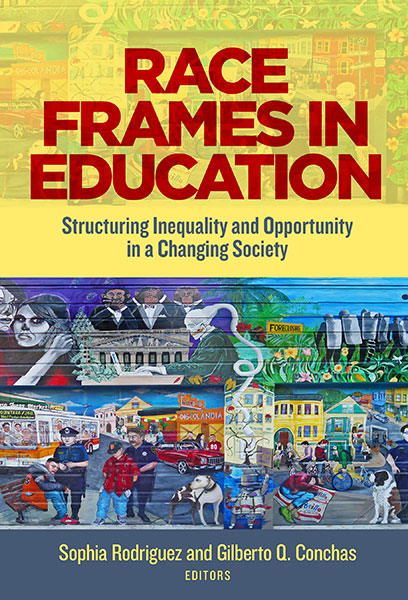Professors: Request an Exam Copy
Print copies available for US orders only. For orders outside the US, see our international distributors.
Edited by: Sophia Rodriguez, Gilberto Q. Conchas
Publication Date: June 24, 2022
Pages: 288

Beyond the commonplace inequalities that many minoritized youth face in the United States, the post-Trump contemporary moment has created rampant racialized material and symbolic violence occurring against Latinx, immigrant and undocumented immigrant, Asian American, and African American populations. Race Frames in Education advances the conversation about racial equity in educational contexts with a unique analysis centered on the concept of racial projects—a way of thinking not only about systems of racial domination and subjugation, but also of resistance. Chapter authors center racial analyses across multiple educational and community-based settings to underscore how racial projects advance equity or reproduce inequality. This much-needed anthology addresses a pressing issue in society: how to center race and expose systemic racism in order to transform communities, schooling, and educational policies. It challenges white dominance in education and social policy and practice in order to understand the material effects of race, racism, and white supremacist logic on minoritized populations.
Book Features:
Sophia Rodriguez is an assistant professor in the Department of Teaching and Learning, Policy and Leadership at the University of Maryland, College Park. Her scholarly work appears in Anthropology & Education Quarterly, Teachers College Record, and Urban Education among other outlets. Gilberto Q. Conchas is the Wayne K. & Anita Woolfolk Hoy Endowed Professor at The Pennsylvania State University. His books include The Color of Success: Race and High-Achieving Urban Youth, Cracks in the Schoolyard—Confronting Latino Educational Inequality, and Streetsmart Schoolsmart: Urban Poverty and the Education of Adolescent Boys.
“In Race Frames, the contributors frame units of analysis as racial projects to cut through the best intentions of equity-driven policies and practices, and observe how they often implicitly reproduce racialized/ing inequality. … (The book) is particularly timely in this way, as equity language has become increasingly hegemonic in education and susceptible to being appropriated to justify policies, pedagogies, and forms of care that harm racially marginalized youth.”
—Teachers College Record
“This is an excellent book that can be a resource for readers of all educational levels interested in racial issues in US education.”
—CHOICE
“This unique and stunning volume dramatically illustrates the multiple ways that race profoundly shapes educational policies, practices, and the lived experiences of students and their families. Unified by the concept of racial projects, the essays not only demonstrate the depth and persistence of structural racial inequality, but also provide us with an understanding of how students and communities resist and contest the deleterious effects of racialization in schooling.”
—Michael Omi, professor emeritus, University of California, Berkeley
Professors: Request an Exam Copy
Print copies available for US orders only. For orders outside the US, see our international distributors.